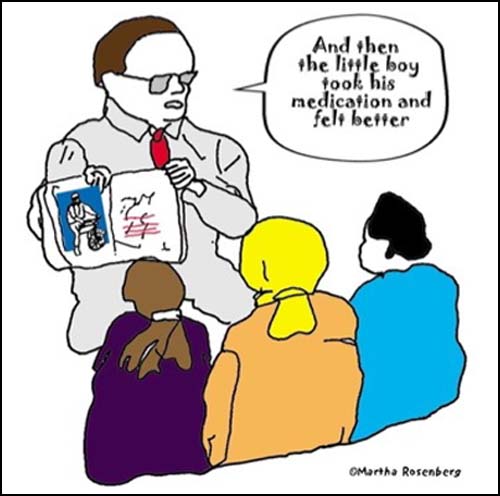Just as the public is digesting the fact that former chairman and CEO of drug giant Genentech, Art Levinson, is now the CEO of a new Google life sciences venture with Big Pharma and that he also serves as chairman of Apple Inc., there are more insidious “partnerships” between Pharma and top corporations. Walgreens has now announced a “partnership” with Mental Health America, an advocacy group so steeped in Pharma money, it was investigated by Congress.
Spinning the Big Pharma fiction that “one out of five people has mental illness” Walgreens will now “screen” customers to see if they might need expensive psychiatric drugs. They sure hope so. Pharma has also enlisted pharmacies to send registered nurses to patients’ homes when they are on expensive drugs to make sure they are taking them and to phone patients at home to make sure they don’t abandon their three and four prescriptions waiting for them at the pharmacy. Ka-ching.
Screening as a ruse to get more patients is an historical tactic used by Big Pharma whether identifying toddlers and elementary school children who need behavioral “interventions” or screening mothers and mothers-to-be to see if they are “depressed” and need expensive SSRI antidepressants.
TeenScreen, a program at Columbia University in New York City from 2003 until 2012 offered “free” psychiatric services to screen children for suicidal tendencies and emotional problems. Directed by Leslie McGuire, formerly a leader at the drug industry funded National Alliance on Mental Illness (NAMI), Teenscreen “routed [children] into ‘mental health’ treatment,’” wrote the Idaho Observer. “Many of these would be ‘treated’ with psychiatric drugs, ignoring the fact that many of these very same drugs carry FDA-mandated Black Box warning labels because they are known to cause violence and suicide.”
Though TeenScreen was shut down in 2012, new early intervention programs have replaced it. Red Flags International, a school-based program, enlists teachers, parents and schools in seeking the “red flags” of imminent depression and mental illness in children. “One in five kids will experience a diagnosable emotional or behavioral problem before they become adults,” says the Red Flags website, listing “common warning signs of impending mental illness” and playing the “early intervention” card.
While it serves Pharma to call people with situational depression and everyday problems, anxiety, alcohol and drug misuse and growing up problems “mentally ill,” it is an egregious bald-faced lie that raises health care costs and harms young people through misdiagnosis and life-long, unnecessary drug use. Pharma and its front groups yell that mental illness is “under-diagnosed” and has a “stigma.” But recently the New England Journal of Medicine published a report suggesting just the opposite: the rate of severe mental illness among children and adolescents has dropped—not risen “This study shows that the extremely high rates of childhood mental disorder reported by the C.D.C. and others result from flawed assessment methodology that includes many kids who have very mild impairment or no impairment at all,” said Dr. Allen Frances, a professor emeritus of psychiatry at Duke University. Shame on you, Walgreens.
Martha Rosenberg is an award-winning investigative public health reporter who covers the food, drug and gun industries. Her first book, “Born With A Junk Food Deficiency: How Flaks, Quacks and Hacks Pimp The Public Health,” is distributed by Random House. Rosenberg has appeared on CSPAN and NPR and lectured at medical schools and at the Mid-Manhattan Public Library.



